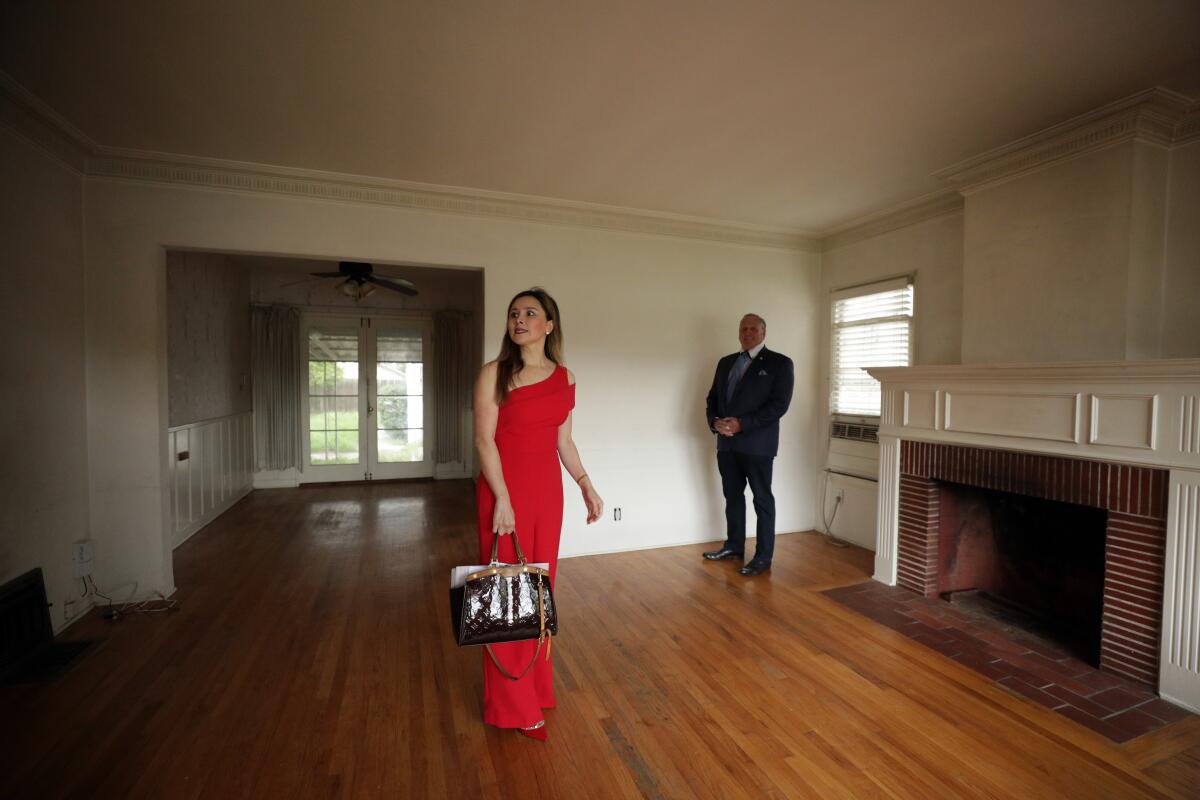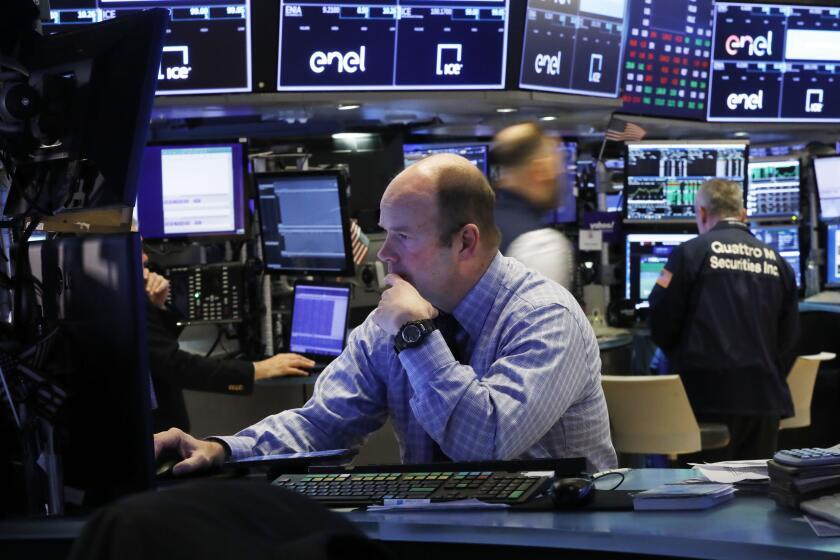Southern California home buying hasn’t been slammed by coronavirus fear — yet

Sports leagues have suspended their seasons. Organizers have canceled conferences. The novel coronavirus is starting to inflict economic damage as Americans hunker down to stop its spread.
So far, though, home-buying demand — spurred by generationally low mortgage rates — has held up in Southern California, real estate experts say.
That could quickly change if the economy shuts down for a prolonged period. Low mortgage rates don’t matter if people don’t have jobs to pay their mortgage.
“It’s kind of a tug of war: interest rates on the one side and some of the business fundamentals on the other side,” said Stuart Gabriel, director of the Ziman Center for Real Estate at UCLA. “How we are going to sort of muscle through this depends very significantly on the path of the virus, the severity of the incidents and the related cycle of fear.”
California’s growth will slow this year as unemployment rises and job creation weakens in the wake of the coronavirus outbreak, according to a UCLA forecast.
Heather Presha, a real estate agent who specializes in South L.A., isn’t seeing a lot of fear.
She held an open house for a $542,000 two-bedroom in Hyde Park on Tuesday. It was raining and one day after stock trading momentarily halted because of a steep and swift drop.
Presha said about 55 buyers and agents strolled through the home. “I heard some people muttering about not hugging and stuff,” she said. “And someone mentioned Coachella was canceled. But it hasn’t affected buying or wanting to purchase a home.”
In a fast-moving crisis, that mood could turn on a dime. A day after Presha’s open house, the stock market entered bear-market territory. On Thursday, trading again stopped briefly and the stock market had its worst day since 1987.
California officials have upped their insistence that residents practice “social distancing” and urged the cancellation of events with 250 people or more. In addition to the suspension of multiple sports leagues, Disneyland on Thursday said it will shut down until at least the end of the month.
Even before then, some agents were seeing signs of caution creeping in. A California Assn. of Realtors survey conducted from March 6 through March 9 said a quarter of agents had clients hold back from buying and selling because of the coronavirus. More than a third said they’re getting questions from clients about what has since been declared a global pandemic.
The real estate industry had been prepping for a busy 2020. The market, juiced by a combination of cheap money and a steady economy, was heating up after a prolonged slowdown.
In January, the latest month for which there are data, the median home price in Southern California shot up nearly 7% from a year earlier to $533,000, according to DQNews. Home sales surged nearly 18%.
One potential concern for home shoppers going forward is what happens to the money they were counting on for a down payment. Stocks, bonds, gold, bitcoin — assets are falling in value across the board.
John Underwood, who manages Redfin’s L.A. office, said he had a buyer pull back an offer for a roughly $700,000 three-bedroom house in Lakewood because “most of his down payment was tied up in the stock market.”
Luxury home builder Toll Bros. has also had a handful of delayed closings because buyers from China had “transportation or other logistical challenges ... such as closed banks or offices in China,” said Christine Sciarrotta, the company’s vice president for brand management.
So far, such hiccups are rare, said Steven Thomas, who tracks the Southern California market at Reports on Housing. As of Wednesday, he said, time on the market was 48 days in LA. County — the same as a week earlier. “Anything under 60 days is hot,” he said.
Celine Yan is among those forging ahead.
In the time of the coronavirus, the most staid of business traditions -- the handshake -- is taking new forms.
The Los Angeles real estate investor is in escrow on a fixer-upper in North Hollywood, listed at $519,000. Despite the economic uncertainty, she said she plans to plunge $200,000 into renovating the home and build a large accessory dwelling unit, or granny flat, in the backyard.
In the worst-case scenario, Yan thinks she could rent out the entire property, but doesn’t expect to have to. By the time the home goes back on the market in the summer, she thinks things will have calmed down.
Brendan Hanna Holloway is making a similar calculation. He now rents a one-bedroom apartment in Santa Monica with his wife and two children. On Wednesday, he put an offer on a two-bedroom condo in the city that is listed at around $1.1 million.
“Viruses run their course,” the 39-year-old video-game developer said on the day he put in the offer. “It’s kind of a temporary bump that’s more scary than fundamental.”
On Thursday, even as the coronavirus turmoil reached a crescendo, Hanna Holloway received a counteroffer from the seller. His thinking hadn’t changed. He bid for a second time.
Jeff Lazerson, a mortgage broker in Laguna Niguel, said he’s had a few clients press pause on their home search. But most of the change has been on the mortgage-refinance side, where he said there’s been crushing demand by homeowners looking to take advantage of low rates.
“I’ve been doing this for 33 years,” he said. “The volume is about double of any refi-mania market I’ve experienced over my career.”
The average rate for a 30-year fixed mortgage hit 3.29% in the week that ended March 5 — the lowest level since Freddie Mac started collecting the data in 1971.
Experts said rates could be lower given mortgage rates usually track the yield on a 10-year Treasury note, which has plummeted as the coronavirus spreads.
Guy Cecala, publisher of Inside Mortgage Finance, said lenders explain they are swamped with refinance business and don’t have the capacity to handle another surge that could follow lower rates.
But Cecala believes a bigger reason mortgage rates didn’t fall more is because people are “lined up” for mortgages in the low 3% range. So why shouldn’t mortgage outfits earn a higher profit while they can? (Rates actually have risen since Cecala spoke. On Thursday, Freddie Mac reported mortgage rates ticked up to 3.36% for the week that ended March 12.)
With the record-setting bull market crashing to an end amid the coronavirus, there still may be some steps average investors can take to limit their losses.
If Treasurys remain at rock-bottom levels, Cecala said, mortgage rates will eventually follow. “At some point they are going to exhaust all the people who are willing to take 3.25% or 3.5%,” he said. “[Or] a competitor is going to blink and start offering the lower rate to take business from them.”
If that happens, without a significant hit to the economy or spread of the virus, many home buyers — especially first-timers who have been locked out of the region’s wildly expensive market — may rejoice.
For now, industry officials are proceeding cautiously, but aren’t expecting a housing market collapse like in 2008.
Jordan Levine, an economist with the California Assn. of Realtors, said the group is slightly revising downward the number of homes it expects to sell in 2020, but not by a dramatic amount. “If unemployment goes up, then we will have to take another look,” he said.
Syd Leibovitch, president of Rodeo Realty, said he’s seen no canceled deals and business is good for now. But he noted his company is also “keeping an eye on what is going on.”
“If [the virus] gets more rampant in our area, we are obviously going to start canceling open houses,” he said.
More to Read
Sign up for Essential California
The most important California stories and recommendations in your inbox every morning.
You may occasionally receive promotional content from the Los Angeles Times.









